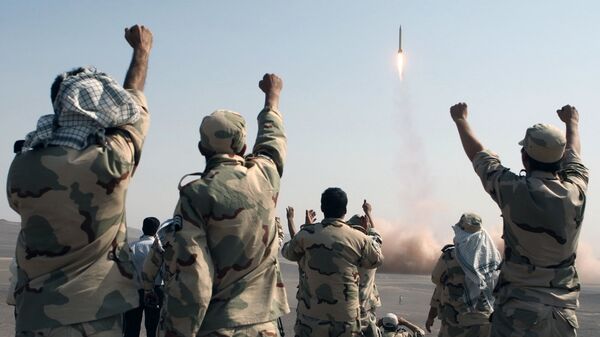When Saudi Aramco’s oil facilities in Buqayq and Khourais came under air attack Saturday, halving the country’s massive daily crude oil output and denting world petroleum markets, many politicians rushed to point the finger at Iran, even though the Yemeni Houthi movement, locked in a brutal, four-year-long war with Riyadh, claimed responsibility for the attack. However, US President Donald Trump has slowly backed off from his “locked and loaded” threats against Tehran as the chorus of voices has grown calling for restraint, levelheadedness and careful investigation before making a decision about a response.
Perhaps the most prominent reins-puller has been the Joint Chiefs of Staff, a counsel of US military leaders from each service branch who advise the president on military matters. Gen. Joseph F. Dunford Jr., who chairs the body, stressed in Tuesday comments from London that the US would provide forensic support to Riyadh and give them “time to conduct an assessment and make an announcement as to what they think happened,” the Washington Post reported.
“Having said that, what we saw was an unacceptable act of aggression,” Dunford noted. “There are a number of ways to deal with that.”
Likewise, former JCS chairman retired Adm. Michael G. Mullen told the New York Times Tuesday it was “a situation ripe with the possibility of miscalculation,” requiring communication with Tehran, not posturing and rebuffing.
“We have not had a good line of communication with Iran since 1979, so if something happens, the odds of us getting it right are pretty small,” he noted.
“I think you shouldn’t be surprised,” Gareth Porter, historian, investigative journalist and analyst specializing in US national security policy, told Radio Sputnik’s Loud and Clear Tuesday about the Joint Chiefs’ prudence. “I think it’s very believable that the JCS do not want to get into a war over this crisis.”
However, he also noted he was “a bit surprised” by the magnitude of institutional pushback, which included politicos ranging from Utah Senator Mitt Romney to former NATO chief retired Adm. Jim Stavridis, who urged restraint and adherence to a process of demonstrable proof before deciding on a response or target.
“It’s a good sign,” he said.
However, that said, Trump’s second-in-line, Vice President Mike Pence, beat the war drums once again while speaking Tuesday at the conservative Heritage Foundation think tank, posturing that the US was “locked and loaded” and “ready to defend our interests and our allies in the region. Make no mistake about it.”
South Carolina Senator Lindsey Graham also tweeted on Tuesday, unequivocally calling the oil facility attack “an act of war” that resulted from a loss of “deterrence against Iranian aggression.”
The problems with Iran only get worse over time so it is imperative we take decisive action to deter further aggression by the Ayatollah and his henchman.
— Lindsey Graham (@LindseyGrahamSC) September 17, 2019
Porter noted the attack on the Buqayq facility “dramatically demonstrates that the military situation in the Gulf as a whole is not a turkey-shoot like the United States thought it was some years ago, last time we really had a crisis over the Strait of Hormuz.”
“I think the significance of this entire series of events, particularly the attack itself, is that it shows very dramatically that there is a new balance of power in the Persian Gulf with regard to the Strait of Hormuz. The United States has always assumed that it had the military wherewithal to force a result on the Iranians by virtue of its military superiority in the region, and I think that is now no longer true - not simply because of the drone strike that we’ve seen the results of here, but because of a whole family of new military weapons systems that have equalized, to a considerable extent … the balance of military power within that area.”
“It makes it very difficult, I think, for the United States to feel confident that it could, basically, intimidate Iran in a crisis. They can no longer do it,” Porter told hosts Brian Becker and John Kiriakou.
Porter told Sputnik that Washington’s continued attempts to form a coalition for patrolling the Persian Gulf and Strait of Hormuz signified that the “Trump administration is not willing to take the responsibility for assuring the safety of the ships going through the Gulf. They’re saying, ‘You do it. We’ll provide the intelligence, the command and control, but the United States is not going to provide the warships, the invitation to war, or the trigger for war. That’s going to be the decision of the other countries that are involved.’ I think that’s a very significant change in the US military political approach to the Strait of Hormuz.”
Likewise, Iran’s “fundamental basic interest,” which enjoys the force of national unity, is “forcing the United States to accept the reality” of the situation and to back off its attempts to impose terms of business - or of existence - on Tehran.



